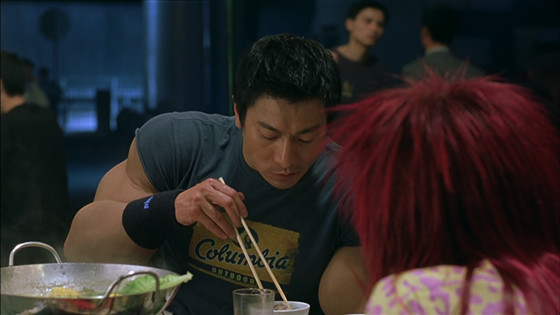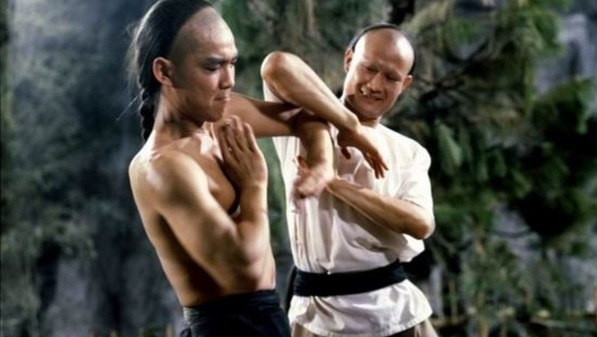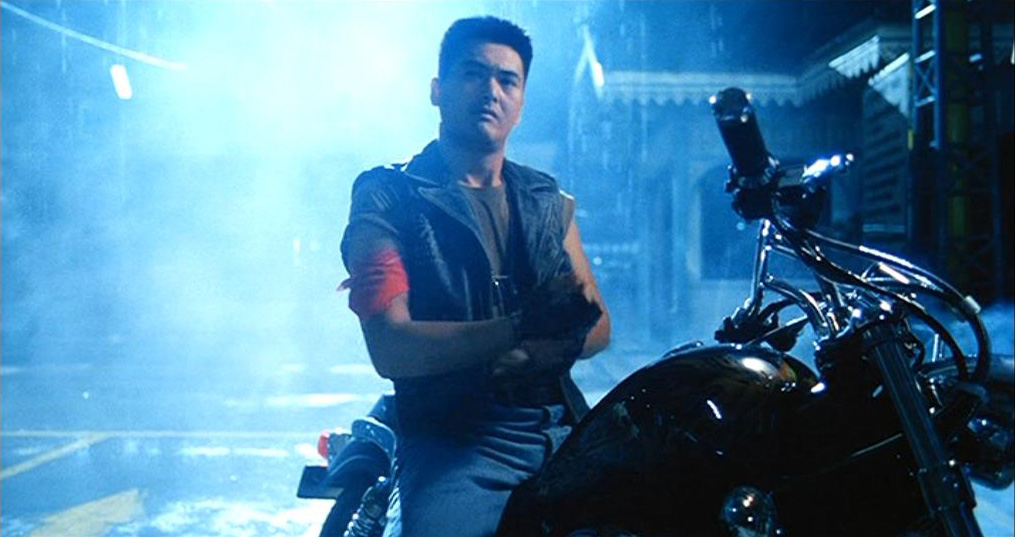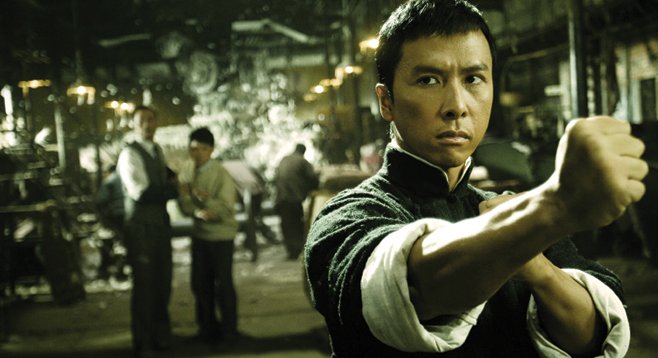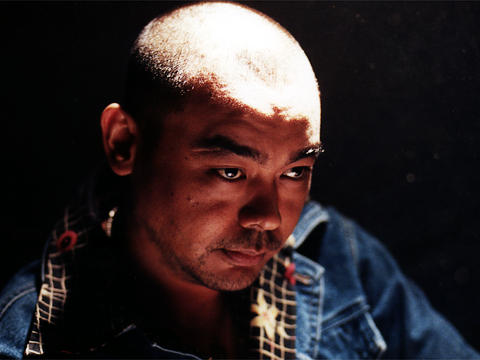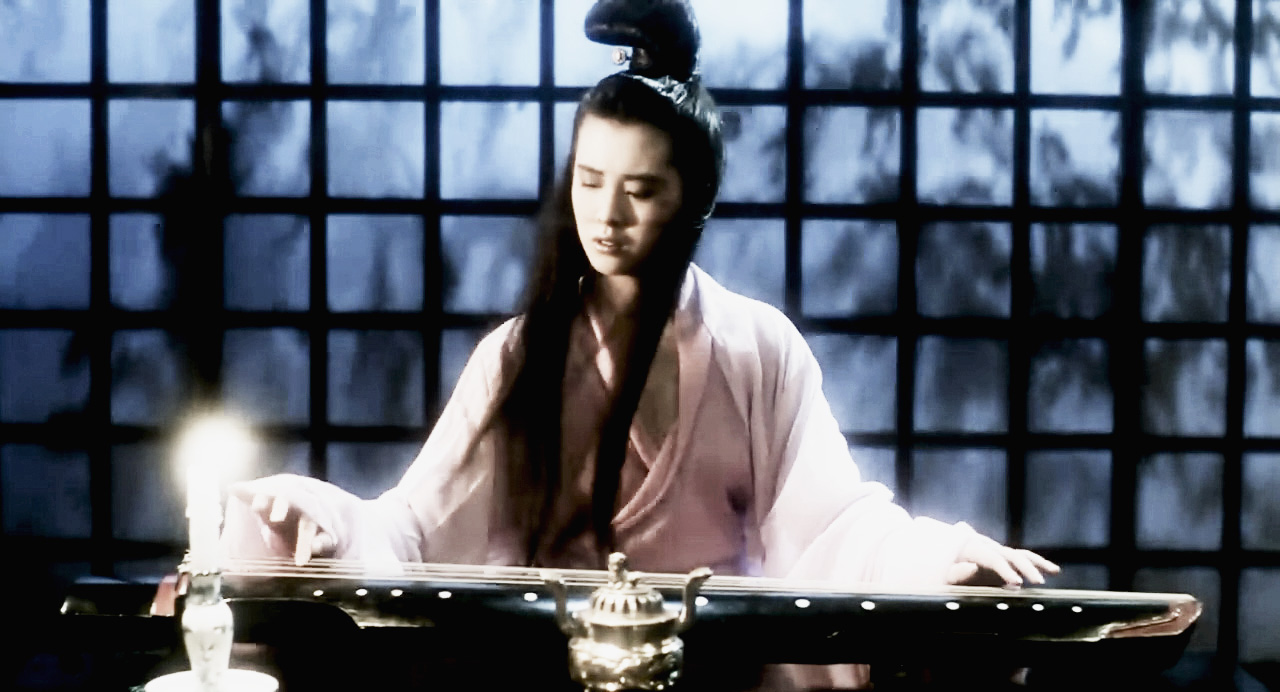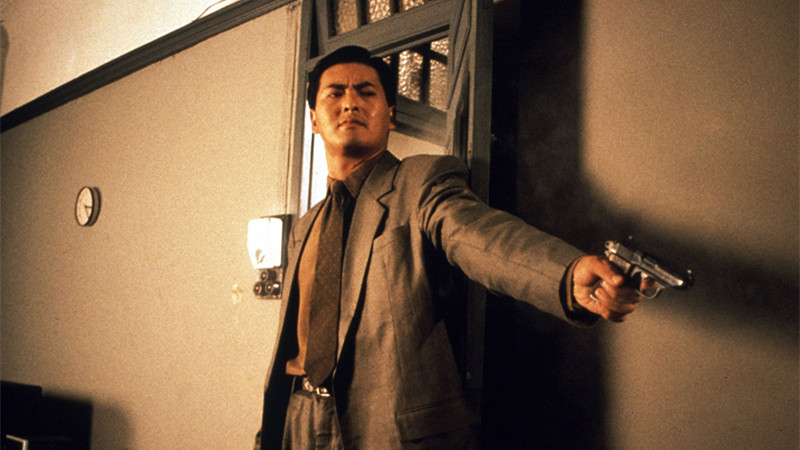7. Running On Karma
The Story:
A former Shaolin monk-turned-male-stripper (Andy Lau), who sees visions of karma around people he meets, gets involved in a murder investigation concerning two martial arts-trained yogis. His visions help provide clues to the killer’s location, but as he develops a personal relationship with a female detective on the case, he is reminded more and more of an unsolved murder from his past that caused him to renounce the spiritual life.
As he and the young woman come to realize that their destinies are fixed, they both eventually head back to the mountains where Lau lived as a monk, in search of a killer still at large.
Why You Should See It:
Johnnie To, sort of an heir apparent to the action throne vacated by John Woo, has crafted a very unusual specimen for the Hong Kong cinema archives: an art house kung fu police procedural that is as much a contemporary urban fantasy as it is a crime drama.
Lau, wearing a full-body prosthetic muscle man suit, plays a man trying to escape from the past who knows full well, as a result of the karmic visions that drove him from being a monk, that the past is always a part of life, and that each new action leads to events that will affect a much larger future than anyone can see.
This is a very Buddhist film, and seems to have been intended as a visual on the nature of karma itself, on private and public responsibility, and on the means to finding peace in a violent and chaotic world.
The film’s philosophic ambitions in no way hinder its entertainment value; this is a fun, intriguing, and fanciful motion picture, populated by odd characters, and full of action and humor. Despite occasional graphic violence and dark tone the film takes on in the last act, the ending is basically optimistic about human nature and the moral implications of living a life mindful of long-term consequences.
6. The Prodigal Son
The Story:
A young nobleman (Yuen Biao) believes himself to be an expert at kung fu, when in fact his father pays local toughs to lose fights to him. After an altercation with a traveling opera company (in one part of which Yuen shows off some of his own real-life vocal training) one of the players—a male performer of female roles who is a wing chun expert—let’s him know that his kung fu is terrible and that he’s being lied to.
Yuen vows to learn wing chun from this man, following and harassing him for months until a tragedy forces them to seek the help of the actor’s brother, another kung fu master played by Sammo Hung. Yuen learns to fight from both of them, and takes on the wing chun master’s enemy in a brutal final showdown.
Why You Should See It:
Years before what came to be considered the new wave of Hong Kong film making, director and fight choreographer Sammo Hung was blazing a new trail in film technique for Hong Kong cinema—or perhaps it’s more accurate to say, he was returning to the more technically competent and visually lavish style of Shaw Brothers studios in the 1960s.
People accustomed to Hong Kong fight films with corny or strained humor are encouraged to seek this movie out. Many of the slapstick and sight gags Hung creates really hit the mark, and they mix well with a martial arts storyline of revenge and redemption.
As with much of Hung’s earlier films the fight scenes are performed with speed, agility and grace, displaying an intricate visual density that pushes the standard of martial arts choreography at the time to the next level. Yuen Biao, who for a long time frequently collaborated with Sammo Hung and Jackie Chan before the professional relationship between those two men dissolved, is outstanding in the lead role.
5. Full Contact
The Story:
Chow Yun-Fat plays a man in Thailand whose brother (Anthony Wong) owes money to a lone shark. In order to raise funds, they team up with a strange trio of robbers (lead by Simon Yam, who excels at playing dangerous characters) who wind up double crossing them, leaving Chow for dead (and costing him a couple of fingers).
After training up and learning to shoot with his left hand, Chow goes back for revenge, though his adversaries appear to have the advantage. Only with the help of his brother and girlfriend, as well as a trusty butterfly knife, can Chow hope to succeed.
Why You Should See It:
It’s safe to say that Ringo Lam’s Full Contact could go toe-to-toe with any American crime film produced around this time. It’s stylish and witty, brutal and peppered with some of the best action sequences of any Hong Kong gangster movie. Chow is shown here at his coolest, in a role that is a bit of a departure from his “trenchcoat killer” parts in similar films.
Critics drew comparisons to the work of John Woo (sometimes with good reason), but Lam’s characters are pushed by much different motivations. Absent is the standard Woo-type bromance, male characters bonding over bloodshed and betrayal—a vengeful Chow grimly goes about the business of seeking retribution against a cold-blooded, sadistic antagonist. Yet as violent and intense as the proceedings sometimes get, there is still a strain of humanity lurking just below the veneer of blood and bullets.
Lam is less sentimental than Woo, and has a better sense of humor, which makes him in some ways a more effective director. He’s also much more honest about the homoerotic overtones of the male relationships in these types of films (Yam’s character is quite clearly bisexual or gay). Populated by people who wouldn’t be out of place in a Tarantino or Coen brothers movie, Full Contact is sophisticated in its execution and looks fantastic, with a story that never fails to keep the viewer interested.
4. Ip Man
The Story:
Donnie Yen plays legendary Wing Chun kung fu master Ip Man, most famous for having once been a martial arts instructor to Bruce Lee. Ip lives in the city of Fushon in the 1930s, practicing his art and existing generally unconcerned with the martial world outside his palatial home, apart from the occasional friendly one-on-one sparring match.
When the Japanese army invades, enslaving and brutalizing many of the city’s inhabitants, including Ip Man himself, he finds he must put his many years of training to a more practical use. He proves his skill to a Japanese general—who is also a martial arts expert—and finds himself challenged to a deadly match against him to preserve the honor of southern Chinese kung fu.
Why You Should See It:
In recent years, movie budgets and technical proficiency have risen to such a level in Chinese cinema that often studios are putting out product that is indisputably world class in quality, as expertly shot and polished as anything put out by big studios in the US.
Any American film fans out there who’ve ever wondered why more foreign titles don’t play in mainstream theaters, a movie like Ip Man probably provides as good an answer as any—films of this caliber would consistently out-perform American-made films in the multiplexes.
Directed by Wilson Yip and starring the inimitable Donnie Yen, whose star has been gradually rising in Hong Kong cinema for decades, Ip Man demonstrates how far fight choreography and performance have come in kung fu cinema. It isn’t fair to call Sammo Hung’s action direction mind-boggling—it’s positively transcendent, so knotted and intricate at times that it’s difficult to track everything that’s happening.
Yen is subdued and charismatic, making Ip a very easy character to root for. A simplistically patriotic mentality to the story is probably the film’s one and only real drawback, but it certainly doesn’t get in the way of enjoying the fine film making on display. This beat Wong Kar-wai’s own Ip Man biopic The Grandmaster to the screen by a few years; legal action was taken over the title, which was originally going to be Grandmaster Ip Man. Followed by Ip Man 2 a couple of years later, with a third film reportedly now in production.
3. The Longest Nite
The Story:
A corrupt cop in Macau (Tony Leung) is given a task by a local mob boss to prevent a hit from being carried out on a rival boss in order to keep the peace between the two gangs. As he struggles to keep things in order, a strange bald man (Lau Ching-Wan) arrives in town, with an agenda Leung can’t quite fathom. As events build to a head, the situation grows more violent, heading toward a fateful and dark finale.
Why You Should See It:
For those who like their crime thrillers downbeat and brutal, The Longest Nite is a good bet. Everyone in the story is corrupt or a criminal, everyone is trying to get over on someone else, there is no trust, no stability, and ultimately, no hope. Yet the film, directed by Patrick Yau and co-produced by Johnnie To, is terrifically entertaining, gripping, and tense, punctuated by some standout scenes (Lau, as the bald hitman, has a great bit where he escapes from a moving car).
The cinematography is outstanding, lending the the story a somewhat glitzy, somewhat sleazy noir atmosphere that underscores the vicious motives of the characters, accompanied by a great score.
Interesting too is how the film handles the idea of the loss of identity: Leung’s cop, framed for taking out the contract on a major boss, goes adrift in his own world, becoming neither a cop nor a criminal, and at the end desperately tries to take on some of the persona of his bald counterpart. A brooding and uncompromising film, with style to spare.
2. A Chinese Ghost Story
The Story:
A down-on-his-luck tax collector (Leslie Cheung) spends the night in an abandoned temple, where he first sees a Taoist monk and a brigand do battle, then encounters the spirit of a mysterious young woman. He nearly falls prey to reanimated corpses (which he fails to notice), and on his second meeting with the young woman, finds out that she is not only a ghost, but is enthralled to an evil forest god she is fated to marry.
With the help of the Taoist monk’s magic, he attempts to free her from her servitude, and in doing so allow her to be reincarnated, before the wedding to the terrible demon takes place.
Why You Should See It:
Producer Tsui Hark is generally regarded as the man responsible for kicking off a new wave in Hong Kong cinema by introducing Hollywood-style special effects and shooting techniques. All of the expertise that made him an international success are fully on display in A Chinese Ghost Story: the camera work is fluid, the editing tight and intricate, and all of the action is beautifully staged, accompanied by impressive visual effects (for the 80s).
Zombies shamble in stop motion and magical energy flies like Star Wars laser blasts, while at the center is a romantic story that is both sweet and engaging.
A charming, light tone maintains along the way—even during some effective horror set pieces—set in an enchanted world of haunted forests and mystic powers. It stands as a testament to the directing skill of Ching Sin-tung, who also directed the incredible Duel To The Death in 1982, and went on to direct both sequels to this film for Tsui Hark as well as the Swordsman trilogy.
The humor works very well, buoyed by a compelling performance by Cheung, as well as those of Joey Wong as the unfortunate ghost and Wu Ma as the magical monk. Horror fans will enjoy the visual references to Sam Raimi’s Evil Dead and John Carpenter’s The Thing, while everyone else will be carried along by the runaway pace and breezy storytelling.
1. The Killer
The Story:
A hitman (Chow Yun-Fat) accidentally blinds a woman in the course of a job, and takes it upon himself to raise the money for surgery that will restore her sight. At the end of another job he’s double crossed, betrayed by a close friend and pursued by a determined cop (Danny Lee) who wants to bring Chow to justice. Multiple gunfights ensue as the killer and his girlfriend go one the run to escape.
Why You Should See It:
I had originally meant to pair this entry with John Woo’s Hardboiled, but between the two films I feel that this one best represents everything that makes a Woo film great: grand operatic drama, intense relationships among the male protagonists (who are often on opposite sides of the law, or opposing factions of the same side), and deadly hurricanes of bullets.
Most people remember the first time they saw this movie—I watched a rented copy twice in a row myself. It’s Woo’s Sistine Chapel or 9th Symphony, a masterpiece of nearly otherworldly action and violence that goes so far beyond what is typically expected of a crime film that it almost becomes the progenitor of new genre. That’s pretty much what happened, when one takes into account the enormous impact Woo’s films have had on Hollywood (helped in part by the fact Woo made movies there himself for a while).
It could be fairly argued that Woo never again returned to the heights he reached with The Killer, employing styles culled from kung fu films, Peckinpah bloodbaths like The Wild Bunch, and American action blockbusters. Apart from maybe Robocop or The Road Warrior (two movies this one has been compared to), it may be the closest thing to a perfect action film out there.
Author Bio: Scot Mason lives in Tucson, AZ. He is the author of the blogs Hawaii Timewarp, Eastern Trails, Scotty’s Movies N’ Tunes, and Tucson Only Kind Of Sucks. He once lived in a shack in the middle of an abandoned sugercane field full of giant spiders and rats, because YOLO.
